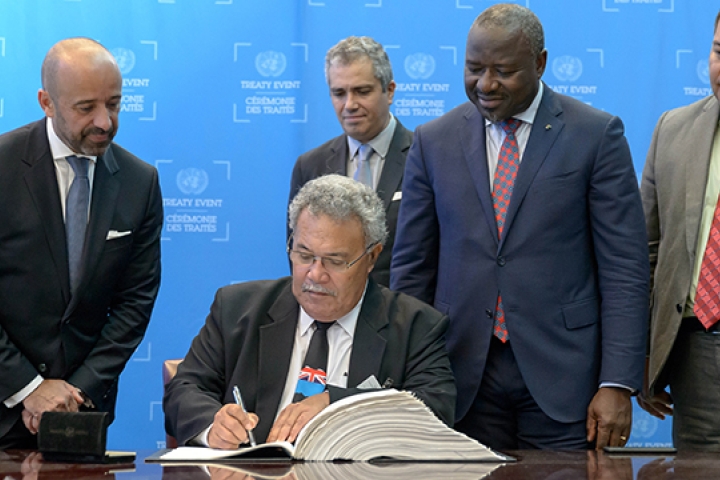Tuvalu signs the Comprehensive Nuclear-Test-Ban Treaty
Vienna, 25 September 2018
Tuvalu has signed the Comprehensive Nuclear-Test-Ban Treaty (CTBT), bringing the number of States Signatories to 184. Of these, 167 have also ratified the Treaty.
The Executive Secretary of the Preparatory Commission for the Comprehensive Nuclear-Test-Ban Treaty Organization (CTBTO), Lassina Zerbo, welcomed Tuvalu’s signature: “For a region that has suffered so much from large-scale atmospheric nuclear testing, where some atolls remain uninhabitable to this day, adherence to the CTBT is the right decision.” Zerbo said “the effects of nuclear weapons and nuclear testing cannot be contained in either time or space. These are critical issues which require global and intergenerational cooperation. I commend Tuvalu for taking this important step to sign and commit to the CTBT. Together we can amplify the message of urgency of the entry into force of the CTBT. This action is the right decision. We will work together with Tuvalu to complete the process.”
Nuclear tests were conducted in different areas of the South Pacific for half a century from 1946 to 1996. The States in the region founded the South Pacific Nuclear Free Zone Treaty in 1985, also known as the Treaty of Rarotonga. Under this treaty, the use, possession and testing of nuclear weapons is prohibited. Support for the global ban on nuclear testing embodied by the CTBT is equally strong, with all but one country in the region Tonga having signed the Treaty.
All South Pacific countries have regularly voted in favour of CTBT resolutions at the UN General Assembly, and the 2010 Pacific Islands Forum in Vanuatu issued a strong statement in support of the CTBT. Despite close to unanimous support from all regions of the world, the CTBT has yet to enter into force. To do so, it must be ratified by all of the 44 States listed in the Treaty’s Annex 2.
These States participated in the negotiations of the Treaty in 1996 and possessed nuclear power or research reactors at the time. Thirty-six have already ratified the Treaty. The remaining eight are: China, the Democratic People’s Republic of Korea, Egypt, India, Iran, Israel, Pakistan and the United States. The CTBT bans all nuclear explosions everywhere, by everyone, and for all times. The CTBTO has established an International Monitoring System (IMS) to ensure that no nuclear explosion goes undetected.
Currently, 296 certified facilities – of a total of 337 when complete – are operating around the world. The data registered by the IMS can also be used for disaster mitigation such as earthquake monitoring, tsunami warning, and the tracking of the levels and dispersal of radioactivity from nuclear accidents.
For further information on the CTBTO, please see www.ctbto.org – your resource on nuclear testing, or contact:
Kirstie Gregorich Hansen
Public Information Officer
T +43 1 26030 6375
E [email protected]
M +43 699 1459 6375

